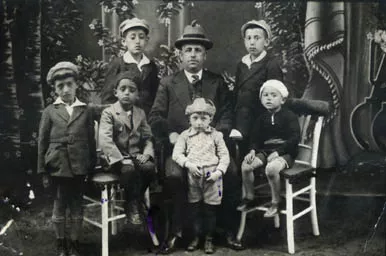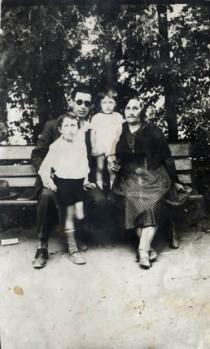Yosif Geron (brother of Rebeka Avram Natan (nee Geron)) with his nephews Mois Merkado Natan, Avram Pinkas, Avram Merkado Natan, Marko Pinkas, Mayer Pinkas and Jacques Pinkas
My uncle Yosif Geron (brother of my mother Rebeka Avram Natan (nee Geron)) with us, his nephews: (from left to right on the first row) Mois Merkado Natan, Avram Pinkas, I, Marko Pinkas. Standing (from left to right) are Mayer Pinkas and Jacques Pinkas (at both sides of uncle Yosif). The picture was taken in Ruse in 1933.
Our cousins and we grew up together. My uncle did not have children and looked after all of us. There was even a tradition - on Sundays, our uncle would hire a carriage, pass by all the sisters and take their children for a walk. My father had a sister who was not married and four brothers. Two of them lived in Dobrich and I have visited them. Their names were Aron and Albert and after 9th September 1944 [the day of the communist takeover in Bulgaria] they moved to Israel.
Everyone in Ruse had small gardens. My mother planted flowers, parsley, dill. There were no animals in the yards. We had servants only for a year. My mother was seriously ill then and we took a very nice girl from the villages. Her name was Kina. We had books at home. My parents loved reading. When we got older, we also read the books. They were in Bulgarian. We had 'The Dreyfus Trial', books in aesthetics and ethics. My brother and I read the novels by Karl May, Mayne Reid, Jack London, Maxim Gorky. We also had prayer books, which my father used. I also knew Ivrit from the Jewish school. My brother still remembers it, but I have forgotten it. I did not buy newspapers, even now I do not like reading newspapers and I do not remember if my parents read them. My father was a religious man. He went to the synagogue, knew all the prayers. He knew Ivrit. He studied until the third grade, but he was very clever, he spoke French, Turkish, Ivrit, Bulgarian and could write in French. We visited my uncle on holidays and usually my father read the prayers. My uncle also read them although he did not know Ivrit so well. My other uncles (my father's brothers) were not religious. On the high holidays we gathered at the house of grandmother Simha.
My parents were part of the Jewish community. My father was in the leadership of the Zionist organization 'General Zionists'. My mother was not interested in politics. They were Zionists, but later under the influence of [their friends] Nikolay and Olga Spasovi they started sympathizing with the communists. After 9th September 1944 my father became a member of the Bulgarian Communist Party and my mother remained 'non-party communist'. My parents got on very well with their neighbors. When the mother of Tosho and Boianka died, the two children were twins, my mother looked after them. They lived in the house next to ours with their father Bai [uncle] Ivan, who was a tailor. They had an elder brother Lyubo who was the age of my brother, while the twins were one year older than me. We played together. Most of my parents' friends were Jews. There was a family, with whom they were very close and when they gathered together, they laughed all the time.
They were very merry people. They were the ones who sheltered us when we were thrown out of the big house. They had three children. One of them died recently in Israel - he was a famous conductor and composer there - Izhak (Ziko) Gratsiani [there is no further information about him]. I cannot remember a lot about him, because I was five years younger than him and did not go out with him and his friends. But Ziko was the leader of the high school orchestra, he even established a Jewish jazz band in Ruse - he was very talented from an early age. I knew his sister Mati, who was only one year older than me. Their family was very easygoing and when they gathered together with my parents, they never spoke about their problems, but they always tried to cheer the atmosphere, especially after the anti-Jewish laws were adopted.





























